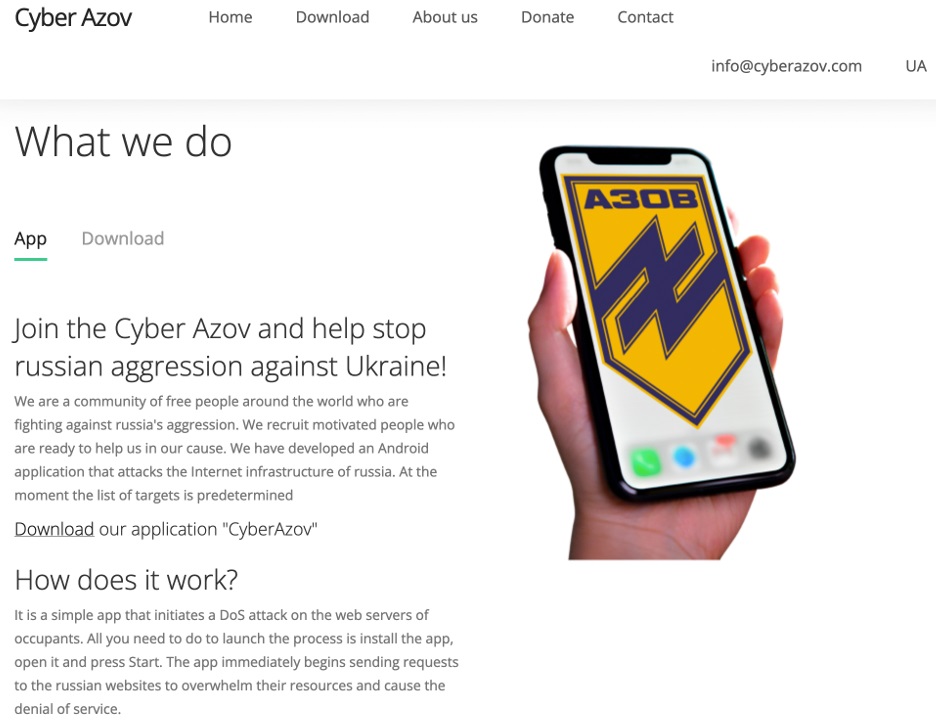Bringing cybersecurity globally to critical and complex key activities
Europe News

Hacktivist group claims to have hit a major Belarus company
A hacktivist group claims to have hit a major Belarus company, aiming to impact the international influence of Lukashenko. According to the CyberKnow media a group of Belarusian attackers referred to as the "Joint Headquarter of the Resistance", launched an operation against the website of the Belarusian company "Belaruskali", one of the face of the Belarusian foreign exchange, in order to reduce the influence of the Lukashenko government internationally. Read more about it : here

Russian hackers use fake DDoS app to infect pro-Ukrainian activists
Google's Threat Analysis Group (TAG), whose primary goal is to defend Google users from state-sponsored attacks, said today that Russian-backed threat groups are still focusing their attacks on Ukrainian organizations. In a report regarding recent cyber activity in Eastern Europe, Google TAG security engineer Billy Leonard revealed that hackers part of the Turla Russian APT group have also been spotted deploying their first Android malware. They camouflaged it as a DDoS attack tool and hosted it on cyberazov[.]com, a domain spoofing the Ukrainian Azov Regiment. Google TAG's analysts believe Turla's operators used the StopWar Android app developed by pro-Ukrainian developers (hosted at stopwar[.]pro) when creating their own fake 'Cyber Azov' DDoS application. "Join the Cyber Azov and help stop russian aggression against Ukraine! We are a community of free people around the world who are fighting against russia's aggression," the attackers prodded potential targets on the app's download page (still up when the article was published). "We recruit motivated people who are ready to help us in our cause. We have developed an Android application that attacks the Internet infrastructure of russia." Read more about it: here
KromSec has targeted belarus
The pro-Ukraine hacktivist group "Kromsec" claims responsibility for an attack on a Belarusian media website "Belarus.news". The attack is part of a wider campaign of cyber attacks by pro-Ukraine hacktivists targeting Belarus for its support of Russia in the war in Ukraine. Read more about it : here

The data of the union of the Valdisieve and Valdarno Municipalities are online
We had recently spoken of an IT attack on the Unione dei Comuni Valdisieve e Valdarno, but we did not know which cybergang had attacked the union, nor the amount of ransom demanded. But as we have always said, ransomware is 'blatant' and lays bare all truths, even those we would never want to talk about. Here is in fact that the cybergang RansomHouse, after the ransom monetization with the union of the Valdisieve and Valdarno municipalities went unsuccessful, publishes after about 2 weeks the data within its data leak site (DLS). Read more about it : here

KNAB comes under cyber attack; political parties financing database and mobile apps down
Due to a recent cyber attack the databases managed by Latvia’s Corruption Prevention and Combating Bureau (KNAB), including Electronic Data Entry Systems, and the institution’s official mobile app Ziņo KNAB have been disrupted, as confirmed by KNAB. KNAB reports that in the evening on 25 July multiple of the institution’s resources suffered a cyber attack. Public accessibility to those resources was disrupted by those cyber attacks. Read more about it: here

Lockbit claims to have released data allegedly stolen from LaPosteMobile
The ransomware group Lockbit claims to have released data allegedly stolen from LaPosteMobile. The data appears to include a database containing customer information including names, email and physical addresses, phone numbers, bank details and dates of birth. It is understood that negotiations with LockBit 3.0 have not yielded any results in the past month, resulting in the release of the data. Read more about it : here

“From Russia With Love” group targeting Ukrainian governement
From Russia With Love. Frwl claims a successful use of Somnia ransomware on Ukraine governmental system. No financial motivation, only destruction. If confirmed its a capability uplift they have planned for months. Read more about it : here
Spanish police arrest two accused of hacking radioactivity alert system
Spain’s National Police said Wednesday that two people have been arrested for allegedly hacking the country’s Radioactivity Alert Network (RAR) and disabling more than one-third of the sensors that are used to monitor excessive radiation levels across the country. The attack occurred between March and June of 2021, and was allegedly carried out by two individuals who were at one point involved in maintaining the system, which is run by Spain’s General Directorate of Civil Protection and Emergencies (DGPCE). The police did not disclose the names of the arrested individuals, or say what motivated the attack. “During the investigation it was determined that the two detainees had been responsible for the maintenance program of the RAR system, through a company contracted by the DGPCE, for which they had a deep knowledge of it that made it easier for them to carry out the attacks and helped them in their efforts to mask their authorship, significantly increasing the difficulty of the investigation,” the National Police said. Read more about it: here

LockBit 3.0 Ransomware Victim : FAAC Group
According to the Redpacketsecurity media, the cybercriminal ransomware as a service group LockBit 3.0 has claimed responsibility for an attack on the Italian-based international group "FAAC" and published this claim on 13 August 2022. Read more about it : here

Following the rocket attacks on the TPP, the enemy launches hacker attacks on the power system
The Russian Federation carried out a cyber attack on the IT infrastructure of the DTEK Group. The attackers' goal is to destabilize the technological processes of generating and distribution companies and undermine the energy security of Ukraine, as well as to spread known false information about the companies' work through state propaganda bodies, and as a result, to leave Ukrainian consumers without electricity. Read more about it: here